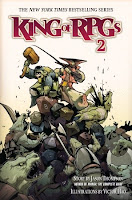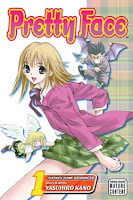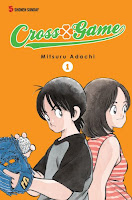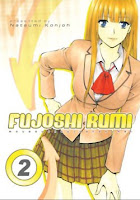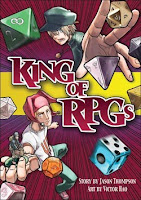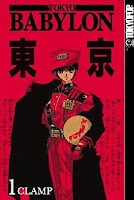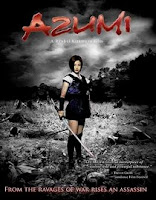My News and Reviews
In my latest manga giveaway, I’ve got a brand new copy of Saki Okuse and Sankichi Meguro’s Ghost Talker’s Daydream, Volume 1 up for grabs. The contest ends this Wednesday, so you still have a couple of days to get your entries in! (Manga Giveaway: Ghost Talker’s Giveaway) Also this week, I managed to sneak in my second in-depth manga review for July. Usamaru Furuya’s Lychee Light Club left quite an impression on me. It’s definitely not a manga for everyone due to its highly graphic nature, but it is well done.
Good news for Wild Adapter fans! After being put on hiatus for so long, the series has found a new home! See Wild Adapter Moves to Ichijinsha at Manga Bookshelf for more information. If you enjoyed my post about Mahjong, Kubota, and Wild Adapter and like mahjong, you might also be interested in a post mentioned by a recent commenter. Ranith at Livejournal has a very cool and detailed breakdown and analysis of an important mahjong game that takes place in Saiyuki: Part 1 and Part 2. Well, I think it’s cool anyway, but then I love mahjong.
Last week was the Fruits Basket Manga Moveable Feast. I wasn’t able to participate this time around, but there were some fantastic contributions from other manga bloggers. You can check out the archive at The Manga Curmudgeon. In other Feast news, The Manga Critic has kindly posted the schedule for the upcoming Manga Moveable Feasts (Manga Moveable Feast Schedule, 2011-12.) You’ll even see my name listed there as a host! I’m both very excited and very nervous about it.
Quick Takes
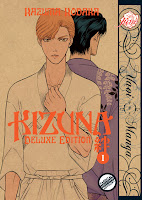 Kizuna, Volumes 1-3 by Kazuma Kodaka. There was a lot of excitement from fans when Digital Manga rescued Kizuna from the Be Beautiful imprint of the now defunct Central Park Media. As for me, I wasn’t familiar with the series until now. So far, I’m liking the characters and, for the most part, the story. The balance between the yakuza elements and the boys’ love elements is handled fairly well. The art, however, is atrociously inconsistent and oftentimes just bad, especially early on in the series. But as the manga progresses, the artwork improves immensely and some of the bonus chapters show off Kodaka’s more current and much more polished style. I’ll probably follow Kizuna a bit further.
Kizuna, Volumes 1-3 by Kazuma Kodaka. There was a lot of excitement from fans when Digital Manga rescued Kizuna from the Be Beautiful imprint of the now defunct Central Park Media. As for me, I wasn’t familiar with the series until now. So far, I’m liking the characters and, for the most part, the story. The balance between the yakuza elements and the boys’ love elements is handled fairly well. The art, however, is atrociously inconsistent and oftentimes just bad, especially early on in the series. But as the manga progresses, the artwork improves immensely and some of the bonus chapters show off Kodaka’s more current and much more polished style. I’ll probably follow Kizuna a bit further.
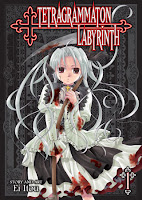 Tetragrammaton Labyrinth, Volume 1 by Ei Itou. Tetragrammaton Labyrinth ended up being a bit more fetishy than I originally anticipated, but I guess I’m not all that surprised. The manga has a slight yuri flavor to it, but it certainly isn’t the primary focus. The artwork is probably the best thing about this particular manga, but that’s not really saying much and the action sequences are often difficult to follow. Tetragrammaton Labyrinth is somewhat of a mess, and it just didn’t work for me. I haven’t been convinced by it the plot or the characters yet. I have no problem with fan service, but Itou has an unfortunate tendency to focus this service on Angela. She might not actually be a twelve-year-old girl, but she is in the body of one.
Tetragrammaton Labyrinth, Volume 1 by Ei Itou. Tetragrammaton Labyrinth ended up being a bit more fetishy than I originally anticipated, but I guess I’m not all that surprised. The manga has a slight yuri flavor to it, but it certainly isn’t the primary focus. The artwork is probably the best thing about this particular manga, but that’s not really saying much and the action sequences are often difficult to follow. Tetragrammaton Labyrinth is somewhat of a mess, and it just didn’t work for me. I haven’t been convinced by it the plot or the characters yet. I have no problem with fan service, but Itou has an unfortunate tendency to focus this service on Angela. She might not actually be a twelve-year-old girl, but she is in the body of one.
 Tokyo Tribes, Volumes 1-2 by Santa Inoue. Tokyo Tribes is another manga that just didn’t work for me this week, albeit for slightly different reasons. Inoue’s artwork is nicely stylized and the English translation and adaptation is very well done. I even really like the covers for this series. However, the manga seems to glorify gang violence and all of the women in it are treated terribly. I actually liked Tokyo Tribes less and less the more I read of it. I don’t care about any of the characters or what might happen to them. In fact, there were several characters that I actively disliked. After two volumes, I don’t feel like I want to or even need to read any more of Tokyo Tribes and so I won’t be.
Tokyo Tribes, Volumes 1-2 by Santa Inoue. Tokyo Tribes is another manga that just didn’t work for me this week, albeit for slightly different reasons. Inoue’s artwork is nicely stylized and the English translation and adaptation is very well done. I even really like the covers for this series. However, the manga seems to glorify gang violence and all of the women in it are treated terribly. I actually liked Tokyo Tribes less and less the more I read of it. I don’t care about any of the characters or what might happen to them. In fact, there were several characters that I actively disliked. After two volumes, I don’t feel like I want to or even need to read any more of Tokyo Tribes and so I won’t be.
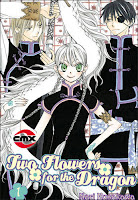 Two Flowers for the Dragon, Volume 1 by Nari Kusakawa. After several disappointments this week, I was very pleased to discover that the first volume of Two Flowers for the Dragon is absolutely delightful. I definitely want to track down the rest of the series, which will unfortunately be a bit expensive since CMX is gone and the manga is out of print. The final volume sadly never even made it into English. Shakuya is the next leader of the Dragon Clan. With the blood and power of a dragon running through her veins, she’ll be responsible for protecting the Oasis. But at the moment, she needs to choose between her two fiancés. Two Flowers for the Dragon has a lovely mix of fantasy and romance. And dragons!
Two Flowers for the Dragon, Volume 1 by Nari Kusakawa. After several disappointments this week, I was very pleased to discover that the first volume of Two Flowers for the Dragon is absolutely delightful. I definitely want to track down the rest of the series, which will unfortunately be a bit expensive since CMX is gone and the manga is out of print. The final volume sadly never even made it into English. Shakuya is the next leader of the Dragon Clan. With the blood and power of a dragon running through her veins, she’ll be responsible for protecting the Oasis. But at the moment, she needs to choose between her two fiancés. Two Flowers for the Dragon has a lovely mix of fantasy and romance. And dragons!
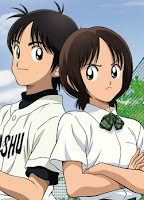 Cross Game, Episodes 23-35 directed by Osamu Sekita. I never expected that I would come to care about baseball so much. Not that I ever had anything against the game, I just was never really all that interested in it. Cross Game has changed that. Because baseball is important to the characters, and the characters are important to me, baseball has also become important to me (at least in the context of Cross Game.) And I’ve learned a lot about the game from the anime—I never realized how much strategy was involved. But while Cross Game is to some extent about baseball, it’s still really more about the characters. I was a little hesitant about the introduction of Akane, but so far it’s been handled well.
Cross Game, Episodes 23-35 directed by Osamu Sekita. I never expected that I would come to care about baseball so much. Not that I ever had anything against the game, I just was never really all that interested in it. Cross Game has changed that. Because baseball is important to the characters, and the characters are important to me, baseball has also become important to me (at least in the context of Cross Game.) And I’ve learned a lot about the game from the anime—I never realized how much strategy was involved. But while Cross Game is to some extent about baseball, it’s still really more about the characters. I was a little hesitant about the introduction of Akane, but so far it’s been handled well.

